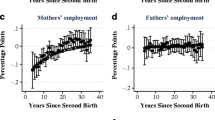Abstract
Research on children of working mothers has indicated that an important relationship exists between maternal employment and subsequent career salience of female offspring. Effects caused by socioeconomic factors have been noted in this relationship but have not been examined either systematically or over time. In the present study, socioeconomic differences were controlled for examination of longitudinal data on established critical factors in career salience of female college graduates. Multiple regression models were estimated for three points in time, covering an eight-year period, for subsamples of single and married women. Details about mother's employment history, respondent's recollection of the attitudes of family members concerning that employment, and indicators of daughter's sex-role ideology were independent variables. Maternal employment was significantly related to both single and married daughters' career salience but in opposite directions and accounted for only a minimum of the observed variance. Related maternal employment variables are associated with career salience of single women early in their postbaccalaureate careers and are not associated with the career salience of married women until somewhat later. Sex-role ideology was important for the career salience of married women but not for single women. The importance of a generalizable context for these findings is discussed.
Similar content being viewed by others
References
Almquist, E. M., & Angrist, S. S. Role model influences on college women's career aspirations. Merrill-Palmer Quarterly 1971, 17, 263–279.
Astin, H. S. The woman doctorate in America. New York: Rusell Sage Foundation, 1969.
Baruch, G. K. Maternal influences upon college women's attitudes toward women and work. Developmental Psychology, 1972, 6, 32–37.
Douvan, E. Employment and the adolescent. In I. F. Nye and L. W. Hoffman (Eds.), The employed mother in America. Chicago: Rand McNally, 1963, pp. 142–164.
Douvan, E., & Adelson, J. The adolescent experience. New York: John Wiley, 1966.
Etaugh, C. Effects of maternal employment on children: A review of recent research. Merrill-Palmer Quarterly, 1974, 20, 71–98.
Ginzberg, E. Educated American women: Life styles and self-portraits. New York: Columbia University Press, 1971.
Hartley, R. Children's concepts of male and female roles. Merrill-Palmer Quarterly, 1960, 6, 83–91.
Hartley, R. What aspects of child behavior should be studied in relation to maternal employment? In A. E. Siegel (Ed.), Research issues related to the effects of maternal employment on children. University Park, Pa.: Social Science Research Center, 1961, pp. 41–50.
Hoffman, L. W. Mother's enjoyment of work and effects on the child. In I. F. Nye & L. W. Hoffman (Eds.), The employed mother in America. Chicago: Rand-McNally, 1963, 95–105.
Hoffman, L. W. Effects of maternal employment on the child: A review of the research. Developmental Psychology, 1974, 10, 204–228.
Miller, S. Effects of maternal employment on sex role perception, interests and self-esteem in kindergarten girls. Developmental Psychology, 1975, 11, 405–406.
Siegel, A. E., & Haas, M. B. The working mother: A review of research. Child Development, 1963, 34, 513–542.
Stolz, L. M. Effects of maternal employment on children: Evidence from research. Child Development, 1960, 31, 749–782.
Sweet, J. Women in the labor force. New York: Seminar Press, 1973.
Tangri, S. S. Determinants of occupational role innovation among college women. In M. Mednick & S. Tangri (Eds.), Journal of Social Issues: New Perspectives on Women, 1972, 28, 177–199.
Turner, B. F. Socialization and career orientation among black and white college women. Paper presented at the 80th annual meeting of the American Psychological Association, Honolulu.
U.S. Bureau of Labor Statistics. Marital and family characteristics of workers, March, 1960. Special Labor Force Reports, No. 13, Washington, D.C.: U.S. Government Printing Office, 1961.
U.S. Bureau of Labor Statistics. Marital and family characteristics of workers, March, 1970. Special Labor Force Reports, No. 130, Washington, D.C.: U.S. Government Printing Office, 1971.
Weil, M. An analysis of factors influencing married women's actual or planned work participation. American Sociological Review, 1961, 26, 91–96.
Author information
Authors and Affiliations
Additional information
Support for this research was provided in part by a grant from the University of Wisconsin Graduate School and NIMH Grant Number MH-13112 to the Departments of Sociology and Psychiatry, Duke University. This research was based on a part of the author's doctoral dissertation.
Rights and permissions
About this article
Cite this article
Del Vento Bielby, D. Maternal employment and socioeconomic status as factors in daughters' career salience: Some substantive refinements. Sex Roles 4, 249–265 (1978). https://doi.org/10.1007/BF00287505
Issue Date:
DOI: https://doi.org/10.1007/BF00287505



